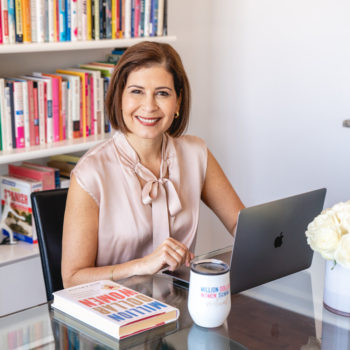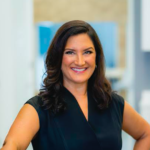Julia Pimsleur has an ambitious mission: to help one million female entrepreneurs achieve $1 million in revenue by 2020. “When I was building my language teaching company, Little Pim, from scratch and trying to get to $1 million in revenues, I wished I had access to female role models and mentors,” Pimsleur says, “I felt this even more when I went out to raise venture capital. There were very few women who had raised venture capital at the time — and few investors who were female — and it was then I learned that just 3% of women entrepreneurs get to $1 million in revenues and that just 4% of venture capital goes to women-run businesses!” Pimsleur started fundraising bootcamps to make an impact on reversing the startling statistic. Over the course of three years, Pimsleur helped 75 women raise a collective $15 million in angel and venture capital for their businesses. The bootcamps inspired her to write her first book, Million Dollar Women: The Essential Guide for Female Entrepreneurs Who Want to Go Big, and create the company Million Dollar Women to further her mission.
What inspired you to start Million Dollar Women? What was your career path?
When I was building my language teaching company, Little Pim, from scratch and trying to get to $1 million in revenues, I wished I had access to female role models and mentors. I felt this even more when I went out to raise venture capital. There were very few women who had raised venture capital at the time — and few investors who were female — and it was then I learned that just 3% of women entrepreneurs get to $1 million in revenues and that just 4% of venture capital goes to women-run businesses! That really kept me up at night. I had just read Lean In: Women, Work, and the Will to Lead where Sheryl Sandberg was bemoaning women being stalled at around 15% in C-suite corporate America and in government, but in the entrepreneurial world that would have been a huge leap forward from where we were!
I was a women’s study minor in college and have always been a feminist and social change maker, so I decided to help more women raise capital and scale up their businesses. That led to creating a fundraising bootcamp I ran out of my conference room on weekends. Morgan Stanley offered to host the bootcamp when I outgrew my conference room, and over three years, 75 women raised a collective $15M for their businesses. It inspired me to write my book, Million Dollar Women: The Essential Guide for Female Entrepreneurs Who Want to Go Big. I have set up a new company to help more women go big, after hiring a CEO to run Little Pim, so I can devote myself to teaching, coaching, and speaking.
What has been the biggest challenge and, on the flip side, the biggest reward of starting Million Dollar Women?
My mission at Million Dollar Women is to help one million women get to one million in revenue by 2020. The greatest challenge is achieving scale – I have already worked with hundreds of women through my fundraising bootcamps, online business classes, and speaking and teaching, but now I am looking for the right partners to reach many more women in the United States and in other countries where women entrepreneurs are on the rise. There are close to 10 million women in the United States right now who have started businesses, but only 3% are “going big” (making over $1 million) and statistics show that women are twice as likely as men to shut down because they run out of cash.
I want to show more women how they can scale up, raise funds, and build the business of their dreams. It is so gratifying to help women who are in the same situation I was in when I wanted to scale up Little Pim — a lot of passion and domain expertise but lacking the right knowledge, fundraising strategy, and network to go big. I feel truly privileged to get to spend time with ambitious, driven, generous women with game-changing ideas.
What advice do you have for other women who hope to start their own businesses?
If you are looking to start a business the best question to ask yourself is: “Do I love this idea so much that I would do this work even if I weren’t getting paid for it?” Chances are you’ll be toiling away for at least a few years before you start making any real money, so you want to be sure that you are going to be okay with that. And have an alternate source of income if need be – I didn’t quit my day job as a fundraiser until Little Pim had been up and running nearly a year and a half.
What is a workday as Julia like? Please walk me through a day!
I am an early bird type and really love the mornings. That is when I usually get to the gym and get my best thinking work done such as writing blogs and creating a curriculum. I wake up at 5:45 a.m. most days to have time to meditate for 20 minutes before my kids get up. I also say affirmations every day, I am a huge believer in “mindset mastery” and became a certified master coach practitioner of Neuro-Linguistic Programming this year, which is the same method Tony Robbins was trained in. After I get to the gym or some other form of exercise, such as running in Central Park or Vinyasa yoga, I take my younger son Adrian to school, then usually head to a networking breakfast I have set up or start my writing. I either work from home or go into my shared space near Penn Station. I might also check in with the new CEO of Little Pim. I handed over the keys to her in January 2016 and now just serve on the board.
The rest of the day is usually a combination of meeting with coaching clients, working on blogs, creating content for my Million Dollar Women Academy and, these days, planning for the Million Dollar Women Summit we are holding in March 2017 in New York City. I usually end my day around 6 p.m. and come home to make dinner for my kids (I am half French and love to cook!) and help them with homework. I am divorced, so on the nights I have my kids (we share custody, half-half) I try to be home without fail. Frequently I’ll get back on the computer after they go to sleep and finish up a blog piece or respond to emails. I love my rhythm and feel very fortunate to be on my fourth career, and they just keep getting better! I was a documentary filmmaker, a nonprofit fundraiser, a CEO, and now an author, speaker, and coach.
What are your responsibilities as founder and CEO of Million Dollar Woman?
I am looking for all the ways to help women scale up their businesses, and so far this has taken three main forms. I created an online three-month long business school for women who have a business and are now ready to take it big. I build community online through my coaching and a private Facebook group that all my coaching clients and graduates have access to. I blog about scaling and fundraising issues so that all women can access some of my content for free.
I am also pretty much always preparing for an upcoming talk, teaching opportunity, or conference and, these days, spending a lot of time recruiting speakers and coaches for my upcoming Million Dollar Women Summit.
What are the most important characteristics someone needs to have to be successful in your role?
I think leaders need to have five qualities:
1. Great empathy and a “heart connection” with the people you lead — you have been where they have been or your life experience allows you to identify with them.
2. A “water around rocks” mentality, meaning you will always find a way.
3. The ability to keep learning from other experts and from your students.
4. A vast network — part of my role is to introduce people to each other for possible funding.
5. Humor and humility.
What are three characteristics you look for when you’re hiring a new team member?
1. A strong connection to my mission and values.
2. An ability to take 100% responsibility for his or her work without passing the buck.
3. A growth mindset! (I can’t do that now, but I can always learn how!)
What’s the biggest lesson you learned at work and how did you learn it?
Never react before you have all the data. When you are an entrepreneur so many things go wrong all the time – from the sales dropping, to staff quitting, to harder to anticipate things like natural disasters interfering with your business or calamities like your office flooding. I learned not to react when seemingly awful things happened because you usually don’t have all the information yet. It’s easy to get yourself all worked up — and distracted from what you should be doing — with running through the worse case scenarios. Over time, I realized nothing is unfixable and often you find the solution in a matter of hours or days, so why waste your energy on overreacting? If you can keep a cool head you can usually find the solution faster. Now when anything goes wrong for me – personally or professionally – I stop and ask “Do I have all the data?” if not, if there is anything more I can learn about the situation, I focus on gathering that information instead of having some big emotional reaction. This has saved me tons of time, energy, and visits to the hair salon to cover up gray hair!
Your book, Million Dollar Women: The Essential Guide for Female Entrepreneurs Who Want to Go Big inspired you to start Million Dollar Woman. What are the top three key takeaways you want people to get from the book?
From interviewing women across the country who have built multimillion-dollar businesses from scratch we all agree that you only need three things to go big:
1. The right mindset.
2. The right skillset.
3. The right network.
Everything you need to learn and do falls into these three buckets. All of us figured out how to scale up our businesses by focusing on these three things, and anyone can grow her business to over $1 million in revenues with the right mindset, skills, and network.
What advice do you have for people who want to raise venture capital funding for their business?
Before you raise capital, it’s important to learn how this dance is danced. Are you really ready? What kinds of capital are out there? What dance moves do you have to learn to get it? The article Am I Ready to Raise? Fundraising Tips for Women is a good place to start. You also need to know how to be a “closer.” I have some tips on that in my article How to Close Investor Deals like a Pro. Getting the meeting is one thing — getting the check is another!
What is one thing that you wish you had known when you were starting out your career?
Really “own” what you are great at, and figure out how to hire for the rest, or find advisors or coaches who can help you fill in your gaps. You don’t need to be good at everything!
What is the best advice you’ve ever received?
You can’t cross a 20-foot chasm in two 10-foot leaps. When I heard this from one of my coaches, Gina Mollicone Long, I knew just what she meant. I needed to find a whole different way of operating as a person in order to reach my goals, not just make a tweak here and there.
What is your business advice for other young professional women?
Cultivate a “Be Do Have” mindset. It basically means figuring out who you want to be and get yourself to a place where you can really imagine being that person. Then start doing the things that kind of person would do, and you will ultimately have the things they have. It sounds simple, and it is, but it’s not easy. We can do anything we want, the trick is, it’s usually waiting for us just beyond our comfort zone.
This post was originally published on my Forbes column. Image via Julia Pimsleur.

































2 Responses to Career Profile: Julia Pimsleur, Million Dollar Women